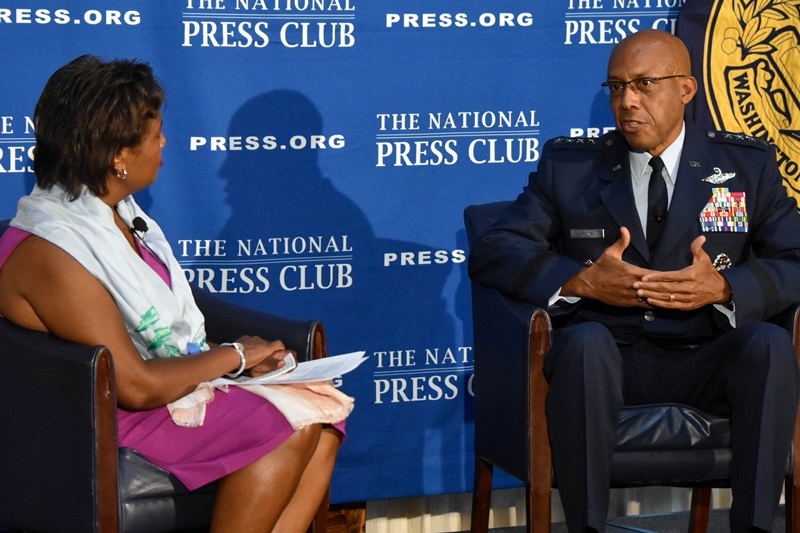Unless U.S. Air Force modernizes, China will become dominant global power, chief of staff warns
The U.S. Air Force must take Immediate measures to accelerate its modernization to prevent China from overtaking the United States as the dominate global power, Air Force Chief of Staff Gen. Charles Q. Brown, Jr. said at an in-person National Press Club Headliners Newsmaker event Aug. 6.
“Without change we are at risk of losing – risk of losing our competitive advantage in a highly contested environment, risk of losing our credibility with our joint teammates and our allies and partners, risk of losing quality airmen and our families – but most importantly, risk of losing our ability to defend our national interest,” the general said to Club President Lisa Nicole Matthews, who moderated the event.
With a palpable sense of urgency and gravity, Brown told the Newmaker audience, “When we leave here today, I want you feeling as concerned as I am and understanding that the rate of change must increase.”

The general added, “We must seize the moment of opportunity right here, right now. If we don’t, losing all we cherish becomes a distinct possibility. I’m committed as the Air Force Chief of Staff to push for a rate of change so that possibility never materializes.”
Brown presides over the organization, training and equipping of 689,000 active-duty, Guard, Reserve and civilian forces, and is a member of the Joint Chiefs of Staff advising the Secretary of Defense, National Security Council and the President. He is also a command pilot with more than 2,900 flying hours including 130 in combat.
Last year Brown announced an aggressive, strategic approach for the Air Force titled “Accelerate Change or Lose,” challenging the status quo and pushing for rapid change to compete with global adversaries.
According to Brown, from 1944-1984 the Air Force was introducing a new fighter model every two and a half years. Since 1984, the force has introduced only four.
“If we’re not able to phase our transition starting with the FY23 budget cycle submission, we will likely miss the mark and the consequence will be irreversible,” said Brown, adding that in 2030 the U.S. would be fighting with the same force largely designed during the Carter and Reagan administrations.
By contrast, according to Chinese President Xi Jinping, China’s armed forces will be fully modernized by 2035 and world class by 2050. Brown said China continues to move that modernization timeline leftward, with its rate of change outpacing the United States.
Of particular concern, said Brown, is the “slow and insidious” nature of China’s military advances. Its installations in the South China Sea “weren’t built overnight, they were built right underneath our nose,” he said. And the U.S. has been distracted elsewhere. Brown said China is “an adversary that’s been watching us for the past 20 years while we’ve been focused on the Middle East.”
Compounded by its assertion of economic power, including the bullying larger nations with its trade strategy, within 10 years China will possess the means to influence the international stage against the U.S. interest, Brown warned.
“I really believe it’s all specifically designed to defeat the advantage that the United States has, particularly from a military aspect but from an economic aspect as well,” Brown said.
As necessary counter-measures, Brown cited the right-sizing the Air Force’s fighter fleet and transitioning from aging aircraft. To ensure the defense of U.S. air bases and generate combat power, he said the nation must also invest in passive defense, cyber defense and defense against unmanned aerial systems. Modernizing intercontinental ballistic missile (ICBM) capability with the Ground Based Strategic Deterrent (GBSD) and bringing on the B-21 will be paramount. Other priorities include advanced battle management systems, and modernizing the sensing grid and ability to track air and ground targets.
In response to the GAO’s warning last month that projected sustainment costs for the F-35 joint strike fighter are unaffordable, Brown said the F-35 " is the cornerstone of our fighter fleet. It is the future of our Air Force.” Brown has been working with industry partners to bring down the cost.
The general also addressed other actions the Air Force is taking to ensure future success, including encouraging COVID-19 vaccinations. Though policy has not been announced on mandating the vaccine, Brown is encouraging vaccination not only for personal health interests but also because “it’s an aspect of making sure we have the readiness to be able to execute whatever the nation calls.” Over 60 percent of airmen are fully vaccinated.
As the first Black chief of a U.S. military service, diversity and inclusion is also a huge priority for Brown. Last summer a video he posted on Facebook addressing the death of George Floyd that went viral. “One of my goals as the chief of staff is to create and maintain an environment where all can meet their full potential,” he said, adding that the class of 2025 is the most diverse class in the history of the force.
